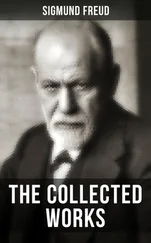A great deal of what we have called "dream condensation" can be thus formulated. Each one of the elements of the dream content is overdetermined by the matter of the dream thoughts; it is not derived from one element of these thoughts, but from a whole series. These are not necessarily interconnected in any way, but may belong to the most diverse spheres of thought. The dream element truly represents all this disparate matter in the dream content. Analysis, moreover, discloses another side of the relationship between dream content and dream thoughts. Just as one element of the dream leads to associations with several dream thoughts, so, as a rule, the one dream thought represents more than one dream element . The threads of the association do not simply converge from the dream thoughts to the dream content, but on the way they overlap and interweave in every way.
Next to the transformation of one thought in the scene (its "dramatization"), condensation is the most important and most characteristic feature of the dream work. We have as yet no clue as to the motive calling for such compression of the content.
In the complicated and intricate dreams with which we are now concerned, condensation and dramatization do not wholly account for the difference between dream contents and dream thoughts. There is evidence of a third factor, which deserves careful consideration.
When I have arrived at an understanding of the dream thoughts by my analysis I notice, above all, that the matter of the manifest is very different from that of the latent dream content. That is, I admit, only an apparent difference which vanishes on closer investigation, for in the end I find the whole dream content carried out in the dream thoughts, nearly all the dream thoughts again represented in the dream content. Nevertheless, there does remain a certain amount of difference.
The essential content which stood out clearly and broadly in the dream must, after analysis, rest satisfied with a very subordinate rôle among the dream thoughts. These very dream thoughts which, going by my feelings, have a claim to the greatest importance are either not present at all in the dream content, or are represented by some remote allusion in some obscure region of the dream. I can thus describe these phenomena: During the dream work the psychical intensity of those thoughts and conceptions to which it properly pertains flows to others which, in my judgment, have no claim to such emphasis . There is no other process which contributes so much to concealment of the dream's meaning and to make the connection between the dream content and dream ideas irrecognizable. During this process, which I will call the dream displacement , I notice also the psychical intensity, significance, or emotional nature of the thoughts become transposed in sensory vividness. What was clearest in the dream seems to me, without further consideration, the most important; but often in some obscure element of the dream I can recognize the most direct offspring of the principal dream thought.
I could only designate this dream displacement as the transvaluation of psychical values . The phenomena will not have been considered in all its bearings unless I add that this displacement or transvaluation is shared by different dreams in extremely varying degrees. There are dreams which take place almost without any displacement. These have the same time, meaning, and intelligibility as we found in the dreams which recorded a desire. In other dreams not a bit of the dream idea has retained its own psychical value, or everything essential in these dream ideas has been replaced by unessentials, whilst every kind of transition between these conditions can be found. The more obscure and intricate a dream is, the greater is the part to be ascribed to the impetus of displacement in its formation.
The example that we chose for analysis shows, at least, this much of displacement—that its content has a different center of interest from that of the dream ideas. In the forefront of the dream content the main scene appears as if a woman wished to make advances to me; in the dream idea the chief interest rests on the desire to enjoy disinterested love which shall "cost nothing"; this idea lies at the back of the talk about the beautiful eyes and the far–fetched allusion to "spinach."
If we abolish the dream displacement, we attain through analysis quite certain conclusions regarding two problems of the dream which are most disputed—as to what provokes a dream at all, and as to the connection of the dream with our waking life. There are dreams which at once expose their links with the events of the day; in others no trace of such a connection can be found. By the aid of analysis it can be shown that every dream, without any exception, is linked up with our impression of the day, or perhaps it would be more correct to say of the day previous to the dream. The impressions which have incited the dream may be so important that we are not surprised at our being occupied with them whilst awake; in this case we are right in saying that the dream carries on the chief interest of our waking life. More usually, however, when the dream contains anything relating to the impressions of the day, it is so trivial, unimportant, and so deserving of oblivion, that we can only recall it with an effort. The dream content appears, then, even when coherent and intelligible, to be concerned with those indifferent trifles of thought undeserving of our waking interest. The depreciation of dreams is largely due to the predominance of the indifferent and the worthless in their content.
Analysis destroys the appearance upon which this derogatory judgment is based. When the dream content discloses nothing but some indifferent impression as instigating the dream, analysis ever indicates some significant event, which has been replaced by something indifferent with which it has entered into abundant associations. Where the dream is concerned with uninteresting and unimportant conceptions, analysis reveals the numerous associative paths which connect the trivial with the momentous in the psychical estimation of the individual. It is only the action of displacement if what is indifferent obtains recognition in the dream content instead of those impressions which are really the stimulus, or instead of the things of real interest . In answering the question as to what provokes the dream, as to the connection of the dream, in the daily troubles, we must say, in terms of the insight given us by replacing the manifest latent dream content: The dream does never trouble itself about things which are not deserving of our concern during the day, and trivialities which do not trouble us during the day have no power to pursue us whilst asleep .
What provoked the dream in the example which we have analyzed? The really unimportant event, that a friend invited me to a free ride in his cab . The table d'hôte scene in the dream contains an allusion to this indifferent motive, for in conversation I had brought the taxi parallel with the table d'hôte. But I can indicate the important event which has as its substitute the trivial one. A few days before I had disbursed a large sum of money for a member of my family who is very dear to me. Small wonder, says the dream thought, if this person is grateful to me for this—this love is not cost–free. But love that shall cost nothing is one of the prime thoughts of the dream. The fact that shortly before this I had had several drives with the relative in question puts the one drive with my friend in a position to recall the connection with the other person. The indifferent impression which, by such ramifications, provokes the dream is subservient to another condition which is not true of the real source of the dream—the impression must be a recent one, everything arising from the day of the dream.
Читать дальше












